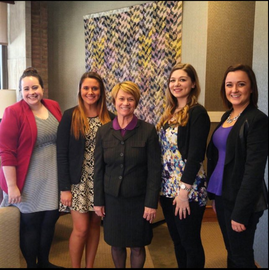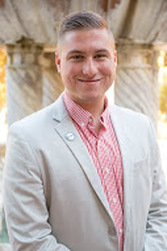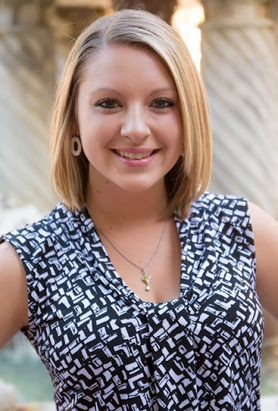|
By Stephanie Smith
I’ve got a secret worth sharing: It’s possible to survive Public Relations Case Studies. As bold as that statement may be, I’ll make even bolder declarations: It’s possible to get something out of it and even remember it fondly. OK. I may be writing this after one too many Coke Zeros, but hear me out, please. I didn’t say it was easy to get through PR Case Studies, I didn’t say it was like a day at Disney World and I didn’t say you might not scream, cry, yawn (a lot), curse the moon, throw darts at my photo and throw the Ron Smith textbook (and your communication plan) across the room a couple of times. But you can survive. And I’m here to tell you how. At least, I’m here to tell you how students have survived my section of PR Case Studies (and I challenge my colleagues to offer their thoughts, too). I offer six survival tips. Do these six things – and add a whole lot of coffee, ice cream, TV breaks and an occasional adult beverage – and it will all work out. I promise. Survival Tip 1: Read I know, It’s unfair. But yes, you have to read. Specifically, you have to read the assigned portions of Planning for Public Relations (our textbook). You have to read all the case studies (spoiler alert: That’s how this class got its name) and yes, you have to read about current events (ouch, right?). Oh, and while you’re on this reading kick, throw in the syllabus and the case study project outline, too. Survival Tip 2: Show Up. Super unfair, I know. I really wish it counted if you were with us in spirit, but I actually need your physical presence, not just your aura or avatar. Next: Show up prepared – prepared to discuss what you’ve read (see tip 1), prepared to think critically, prepared to debate ideas, prepared to take a stand. You can’t hide in my class: I will find you and require you to participate. Public Relations isn’t a spectator sport. Survival Tip 3: Team is Life. If you insist on getting a tattoo, here’s a good one: “Team = Life.” As soon as I assign you to a team, I require you to sit with your team. You will work with your team, breathe with your team, dream, plan and scheme with your team. If you are like other PR Case Studies students, you might cry with your team, fall in and out of love with your team, and plot my demise with your team. You will also evaluate each member of your team—and they will evaluate you. Here’s the bottom line: 45 percent of your grade depends on teamwork. And here’s the bigger point: Success in professional life very often depends on being a good, ethical team player. So play well with each other (and don’t run with scissors). Survival Tip 4: Do the Work. Yep. You knew this part was coming, right? You are going to write three essays all by your lonesome self. You are going to research and write three phases of a communication plan with your team. You are going to earn lots of easy points by taking eight online quizzes. There is no substitute for rolling up your sleeves, showing off that new “Team=Life” tattoo and doing the work. If you don’t hold up your end of the work on your team, well…see tip 3 (the part about peer evaluation). Survival Tip 5: Learn to write well. I know: You already write well. Your goal is to write better. You will get lots of practice. Because practice makes you a better writer (it makes me a better writer, too). You must proofread your work; I deduct points for grammar, usage and punctuation errors. I go crazy when you make spelling errors. Always submit your best draft, not your first draft. Survival Tip 6: Fall in love with your client. Hey, you’ve got room for another tattoo, and “I (heart) My Client” is a good choice. Yes, in my section, I assign clients (always from Kent State). And students don’t always love the client I give them. But if you will immerse yourself in your client’s challenges and aspirations, you will actually begin to care about what happens to your client. You begin to want to do really good work for your client. The best PR Case Studies students learn how to advocate for their clients. They talk incessantly to their roommates, bar-mates, parents and significant others about their clients. And when students really fall in love with their clients, they start arguing with me about what is best for their client. I love that, because over the course of 15 weeks together, I fall in love with your clients, too. Oh, and one more thing: Over the course of our 15 weeks together, I fall in love with you. It really does matter to me and to every single member of this faculty that you do well, that you learn the basics of a PR campaign and that you walk away really proud of the work you’ve done. Stephanie Smith is an assistant professor at Kent State University. Contact her at [email protected].
0 Comments
 By Meghan Caprez Last week, four members of PRSSA Kent ate lunch with Beverly Warren, Ph.D., president of Kent State University. President Warren offered this luncheon as a bidding item for PRSSA’s Homecoming auction last fall, and it sold for $1,000. PRSSA Kent allowed each of its members the opportunity to apply to attend the luncheon, and the Chapter’s professional advisors selected four individuals who applied. I was lucky enough to be selected, alongside PRSSA Kent President Gabrielle Woodard, Vice President of Fundraising and Community Relations Erin Zaranec and Web and Social Media Manager Zabrina Hvostal. Hosted and catered in President Warren’s office, we talked about everything from the Bateman Case Study Competition to the day President Warren’s Twitter account was shut down. Here are 10 of my favorite things that happened during (and after) our luncheon:
On behalf of our entire Chapter, I’d like to say thank you to President Warren and the 10 individuals who bet on this item during our Homecoming auction last fall. Your generous donation was greatly appreciated by those of us who were able to attend the luncheon and those of us who attended PRSSA National Conference this fall. We would not have been able to send 14 of our members to Atlanta without you. Thank you! by Meghan McDonald
What’s more entertaining in the news than campaign coverage in the months leading up to the election? During this campaign season, the big name that’s seemingly always in the news is Donald Trump. He is known for his controversial quotes and outrageous behavior during debates and rallies, many of which end up enraging the public because they come off as racist or sexist. At an Iowa rally in August 2015, Trump dismissed a Latino reporter by saying, “You haven’t been called, go back to Univision.” Univision is an American Spanish broadcast network, so needless to say many people were offended by his comment. It is a wonder to me if all this news coverage is only fueling his fanbase, despite most of it being negative? The saying “all publicity is good publicity” comes into play here. Even though it makes all public relations majors cringe, seeing Donald Trump’s name in the news so frequently may be the cause of him getting votes. According to The Atlantic, when reporters interviewed supporters of Trump and were asked why they were voting for him, a good portion of the people seemed to be motivated by the show he puts on in the media. Trump reinforces the idea that even bad publicity is helping him gain supporters. However this begs the question, what kind of people are voting for him? The Atlantic got quotes from Trump supporters as to their motives for voting for him and their answers were quite telling. One of them said that, “At some level, I don’t really care how things go with America as long as it’s fun to watch.” Another claims that, “Like the joker from The Dark Knight, I just want to see the world burn.” Not exactly the kind of people I want deciding who our next President will be. Luckily, any public relations major can weed out publicity stunts from genuine behavior. However a good way to lose the vote from PR people is something that Trump said at an Iowa rally in November. Trump said, “Did you read about Starbucks? No more ‘Merry Christmas’ at Starbucks. No more. Maybe we should boycott Starbucks.” Please don’t take away our coffee, that is no way to “make America great again.”  PRSSA Kent will be playing their part in advancing the profession and the future professional Friday by presenting a Chapter development session at the PRSSA 2015 National Conference. Chapter development sessions are an interactive, peer-to-peer learning experience where some of the Society’s most influential Chapters present ideas and best practices to members from other schools. The Chapter development sessions are a remarkably important part of National Conference. These presentations give members an unparalleled look into other Chapters and best practices for issues such as member relations, fundraising, publications practices, Chapter branding and many others. Kent State’s presentation this year focuses on an indisputably important topic – university community relations. This presentation will teach Chapters creative and effective ways to create relationships between Chapters and other campus resources. The process of applying for and presenting a Chapter development session is challenging, but as I’m sure many PRSSA Kent folks would attest, it is well worth it. If anyone would know, it’s PRSSA Kent, which is doing a presentation for the second year in a row. The process begins by submitting an application to present. This year, PRSSA Kent’s application was selected from over 20 received. The selected presentation teams then practice their presentations via video chat regularly for two months with PRSSA’s vice president of Chapter development. Throughout the process, presenters are challenged to develop outside the box tactics to solving some of the most basic problems Chapters face. These tactics must then be packaged into engaging and educational presentations that will be presented to hundreds of the nation’s top public relations students. The teams spend hours developing aesthetically pleasing and “how-to” focused presentations. By presenting a Chapter development session, PRSSA Kent is standing out from the crowd. PRSSA Kent’s dedication to presenting a strong Chapter development session is helping to better the Society and educate its members, while also granting the Chapter the national recognition it deserves. Are you attending the PRSSA National Conference in Atlanta? If so, you can check out the PRSSA Kent presentation on Friday at 3:30 p.m. If not, don’t forget to check the PRSSA website for a recap of the presentation! Follow along with all PRSSA National Conference chat using #PRSSANC. See you in Atlanta! Gary Bridgens is the PRSSA National vice president of Chapter development and a senior in the E.W. Scripps School of Journalism at Ohio University. Follow him on Twitter @garingiscaring, connect with him on LinkedIn or email him at [email protected].  by Jenn Shafer | PRSSA National Vice President of Regional Conferences Before I was in public relations, I wanted to do journalism. Not that this is revolutionary, as many PR people start as journalists. I wrote for the school news magazine throughout high school, and decided the summer before my senior year to attend a journalism workshop for a few days. After that little conference, there was one thing I knew: I did not want to go into journalism. The conference showed me what I did not want, and sometimes that can be just as valuable. The important thing is to get yourself out there, and find out. Now in college, I realize public relations is absolutely the career I wanted to pursue, and of course PRSSA was a huge part of that decision. One light-bulb moment came when I attended the 2013 PRSSA National Conference in Philadelphia. Unlike my previous workshop experience, I left that conference knowing I was on the right career path. Attending any National PRSSA event is an experience in itself, but National Conference is on a level all its own. There are hundreds of PR students from across the country - and the world - that flock to this event to learn more about the industry. Students are placed in a professional setting with the opportunity to learn about different areas of public relations from top-notch experts, with topics ranging from crisis communication, media relations and public policy to fashion and food PR. This is the time to learn about new trends and the fast-paced, ever-changing nature of our field. Not to mention the opportunities students are provided with, like the career fair with companies just waiting to hire PRSSA students for internships and jobs. Oh, and the PRSA International Conference, which is always in the same city, so students are rubbing elbows with potential connections left and right. Exploring a new city is also a perk of attending National Conference. My love for travel may cause bias, but being able to see a new city and experience different cultures is invaluable. People learn where they fit in and the type of environment they want to work in after graduation. Just the exposure to different people and ideas is eye opening. And finally, and honestly the most important to me, is the people you will meet at these events. To be in a room with so many driven, successful people that are so similar to you, yet so different because everyone brings something unique with them, is nothing short of amazing. The passion everyone has for this industry is contagious, and the energy (or is it the caffeine?) is electrifying. Networking with professionals is important, but don’t forget the students who attend this conference; they are going places. Plus, odds are they will be your coworkers in the real world, so make friends now. The PR world is surprisingly small! Maybe you will go to this conference and fall in love like I did, or maybe it will be like my journalism workshop and you will walk away with a scheduled appointment with your advisor ready to switch majors. I hope that’s not the case, but at least you will know after leaving if you are in the right place. Either way, attending a PRSSA National Conference is beneficial to your professional and personal growth, plus, I can guarantee you will get at least 50 new followers on each social media site, a stack of business cards and a much higher Klout score. Philadelphia and Washington D.C. were unforgettable conferences, and I’m sure Atlanta will be the best yet! Hope to see you there. Follow Jenn on Twitter @_jennshafer. |
Archives
February 2024
Categories
All
|
 RSS Feed
RSS Feed
